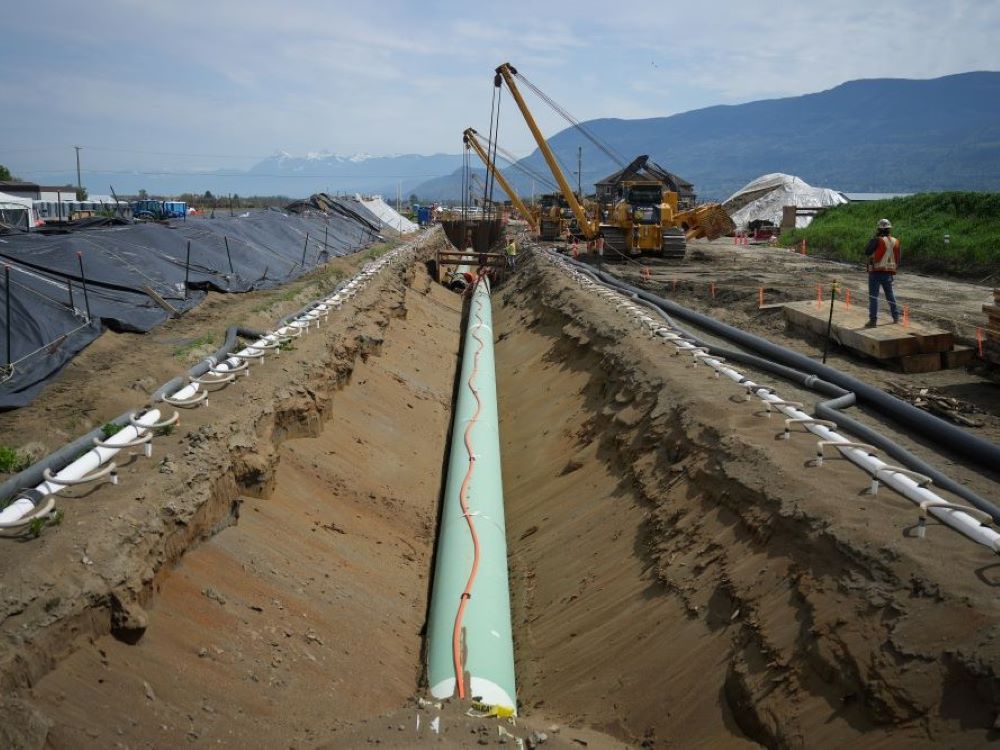Dear Pipeline Owner:
A secret government algorithm has randomly selected you, a proud and resilient Canadian citizen, to receive this critical update on a major public investment.
Although many Canadians struggle to pay for groceries and cannot afford to buy a home let alone a $70,000 Tesla, you now own a significant share of $30.9 billion pipeline expansion project that will transport bitumen from Edmonton to coastal terminals in Burnaby, B.C. Actually, the final price might total $36 billion.
We’re speaking of course of your co-purchase of the Trans Mountain Expansion project, otherwise known as TMX.
Artificial Intelligence, the author of this letter, has calculated that it is better for a few people to grasp some of the evolved financial realities of TMX than for a dangerous aggregation to realize how bad things really are. As a famous Italian once said, “It is necessary for the prince to have the people friendly.”
The primary issue here concerns some distressing math. These numbers emerged in a flurry of dense legal correspondence between Trans Mountain Pipeline and its shippers in preparation for ongoing hearings before the Canada Energy Regulator. You can investigate this jungle of verbiage here or continue reading this important letter.
Trans Mountain Corp., just one of six fine Crown corporations that manage your brave investment, has asked the CER to set new interim tolls for the pipeline. These tolls will then determine final tolls after the pipeline has been operating for a year. The request reflects some less than ideal numbers: the megaproject cost nearly six times more than its original 2012 budget of $5.4 billion.
Obviously the tolls will need to be much higher than originally calculated.
According to the Canada Energy Regulator, “A toll is the price charged by a pipeline company for transportation and other services.”
Tolls allow pipeline companies to operate and ship petroleum goods through pipelines. They also provide “funds for companies to recover capital (the money used to build the pipeline), pay debts and provide a return to investors.”
Unfortunately, the tolls Trans Mountain has asked the regulator to approve are not high enough to keep the company financially viable. This means the pipeline will likely generate no return for investors. In fact, the principal on the loans you have made are at risk. The independent economist Robyn Allan and equity strategist Stephen Ellis at Morningstar Research Services have repeatedly done the math.
If the CER does not adjust tolls to reflect increased costs, Trans Mountain Pipeline has admitted it could become insolvent. It will not be able to pay its debts or interest on debts. Insufficient tolls “would cause Trans Mountain to be unable to meet its financial obligations and significantly impair its ability to attract capital on reasonable terms” it recently noted in its toll application.
Shippers, which include the likes of wealthy companies like Cenovus and Canadian Natural Resources Ltd., have naturally objected to any major toll changes. They frankly don’t want to pay for any of the cost overruns and consider them excessive. In 2020 Trans Mountain estimated the project would cost $12.6 billion. Two years later the estimate jumped to $21.4 billion. In 2023 the company announced in March that the project had increased to $30.9 billion or what one shipper described as “a staggering increase of $9.5 billion in less than a year.”
Meanwhile Trans Mountain Pipeline describes the cost overruns as unfortunate “Acts of God” (fire, floods and pandemic). It argues cost increases are just the new normal for megaprojects, and that they happened at the Site C dam too. It also wonders why the shippers didn’t raise any objections earlier. “Shippers never expressed any concern about the continued appropriateness of the risk allocation until this proceeding,” said the company to the CER. Anyway, it is a complicated picture.
This letter seeks to bring another salient fact to your attention: a fair standard of return. When Kinder Morgan proposed the pipeline expansion, it expected negotiated tolls to pay for the then $5.4 billion project and deliver a return between 12 per cent and 15 per cent. Toll methodology established in CER hearings in 2012 agreed to this kind of fairness.
At the time Kinder Morgan vowed that it “would not proceed with a project that did not meet its targeted IRR for pipeline infrastructure.”
It kept its word. When the budget for the megaproject climbed above $7.4 billion, it abandoned the pipeline and eventually sold it to the Government of Canada in 2018. Kinder Morgan knew that the terms of the contract approved by the regulator in 2012 meant that the majority of cost overruns beyond $7.4 billion would be borne by the pipeline owner since most of the cost increases could not be passed on in tolls charged to shippers who use the pipeline. Given repeated cost overruns, you the owner can no longer expect a return, fair or otherwise.
So the basic facts are these: Trans Mountain spent too much money on a risky pipeline. It bears responsibility for 68.84 per cent of the cost increases while shippers just carry 31.16 per cent. As a consequence Trans Mountain’s profitability and viability remain in doubt. Current tolls average around $4 a barrel. Trans Mountain has proposed to increase them to $10 and $11 a barrel, but even these, say most analysts, will not be high enough to keep Trans Mountain viable. Shippers want to pay even less.
And then there is the issue of debt advanced by the Canadian public directly and Canadian banks. The Canadian bank debt is 100 per cent guaranteed by taxpayers. That means if Trans Mountain defaults, taxpayers are on the hook for the bank debt too. The debt owed directly to Canadian taxpayers (as of June 30) is $16.5 billion and the debt owed to Canadian banks is an additional $16 billion. This $32.5 billion will likely increase before the project is completed.
So please be advised: the solvency and viability of your investment is already compromised, but oil producers want you, the investor, to pay for even more of the project.
One last point. In its submission to the CER on the toll debate the Tsleil-Waututh Nation crunched the numbers further with the conclusion that the tolls wouldn’t create revenue beyond covering costs.
The Tsleil-Waututh Nation then added that the losses “will be much greater than $16.2 billion due to the debt that has been incurred for Canada’s purchase of Trans Mountain, along with interest expense for the purchase and expansion not included in the financing estimate of the construction budget.”
All of this math has implications for you, the dutiful owner of a shiny hydrocarbon transporting pipeline. If Trans Mountain can’t pay its bills, recover its costs, service its debt or maintain a pipeline under repeated assault from climate change, you are liable for these losses.
My letter now ends. You have now been informed of the bad news and some irrefutable math. Canadians own an expanded pipeline, financed 100 per cent by short term debt, that will never make a fair return on its investment.
As Trans Mountain’s lawyers recently noted, any suggestion that higher tolls are not justified will “create significant uncertainty for Trans Mountain and the market regarding future tolls to use the Trans Mountain system, and will make it practically impossible for Trans Mountain to move forward with its business plans until the toll methodology is resolved.”
And such doings will create significant uncertainty for you, the owner, too.
However, there is no need to worry just yet about these remarkable events as this is merely an informational letter targeted to random citizens. Most of the Canadian public, thankfully, has no idea of these unfortunate facts.
Thank you for your limited attention and your public investment.
Have a great day. ![]()
Read more: Energy, Federal Politics
















Tyee Commenting Guidelines
Comments that violate guidelines risk being deleted, and violations may result in a temporary or permanent user ban. Maintain the spirit of good conversation to stay in the discussion and be patient with moderators. Comments are reviewed regularly but not in real time.
Do:
Do not: